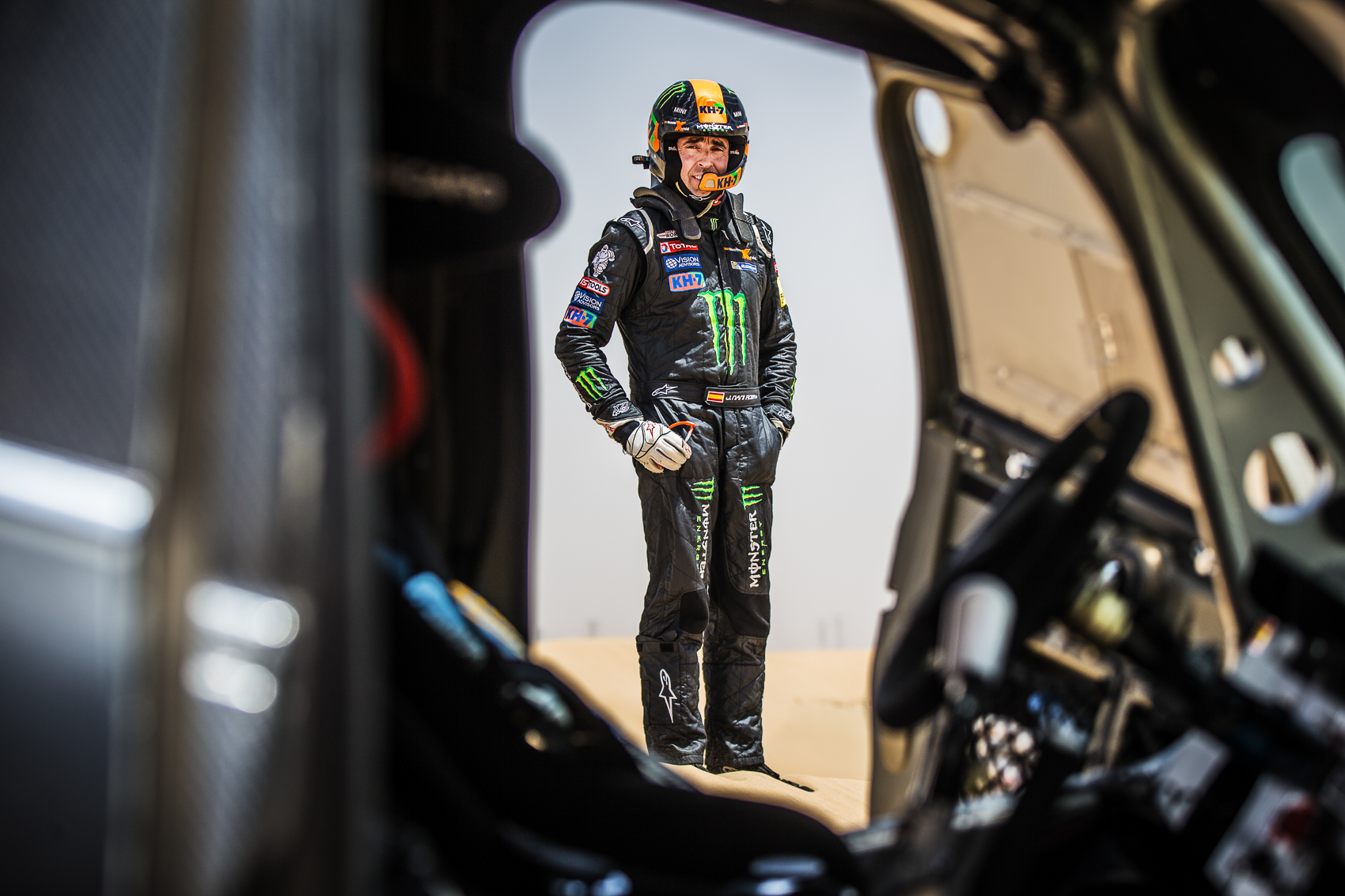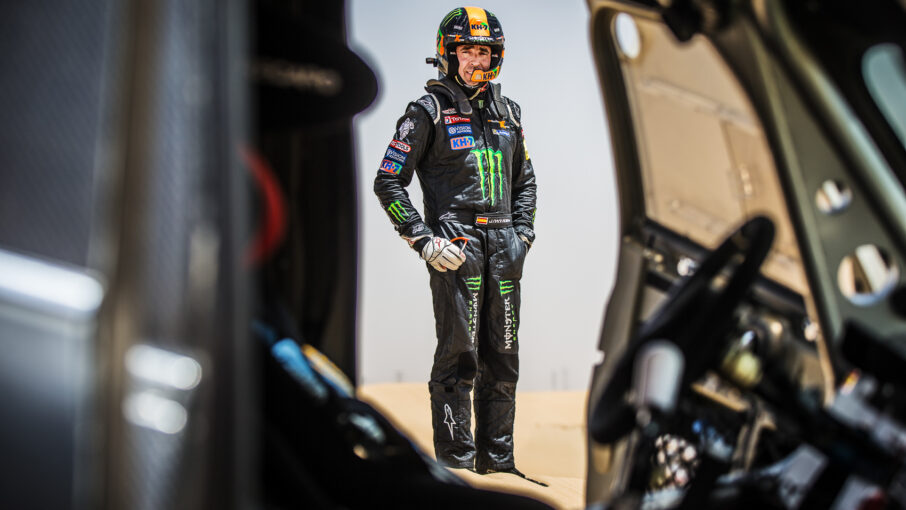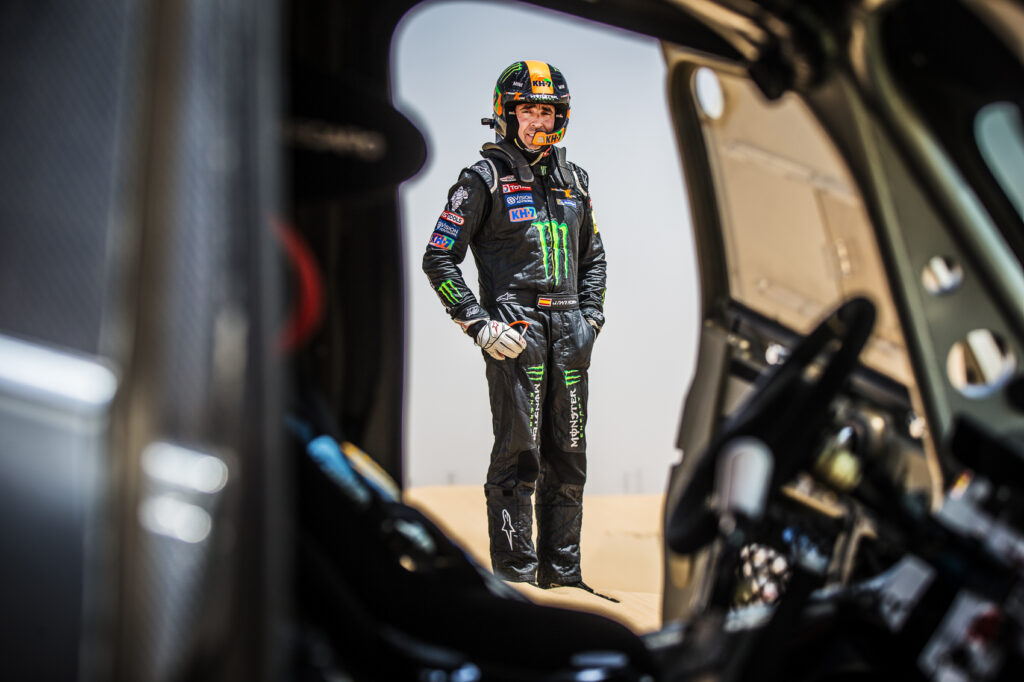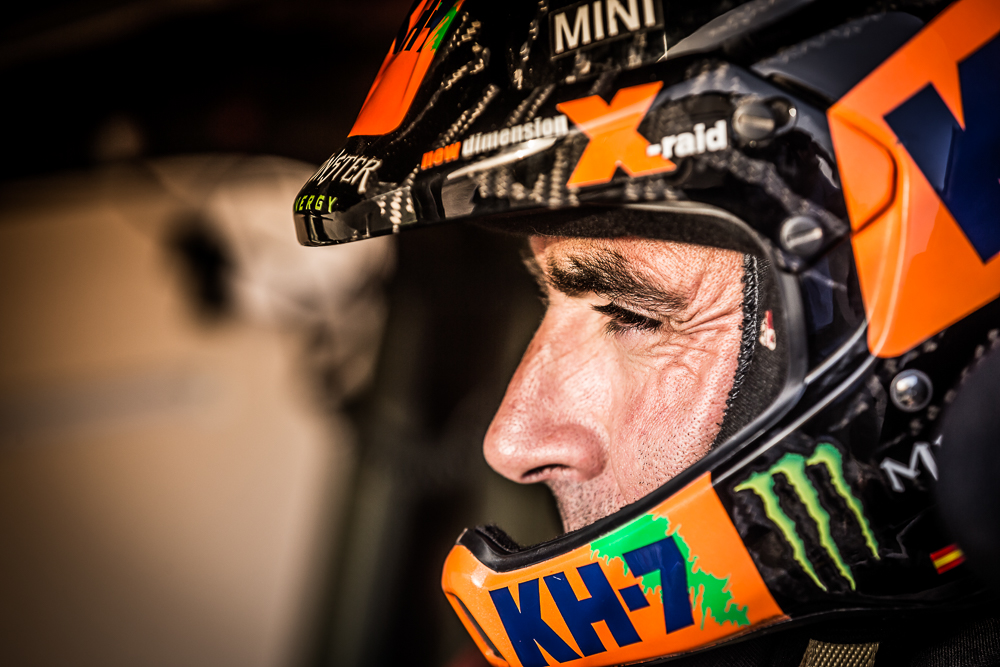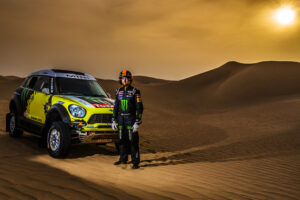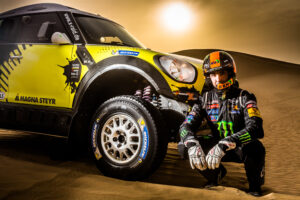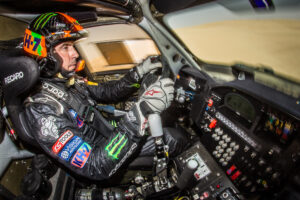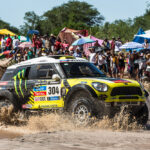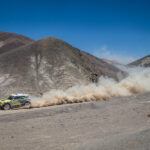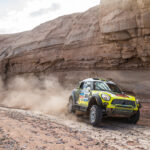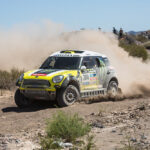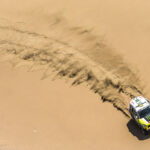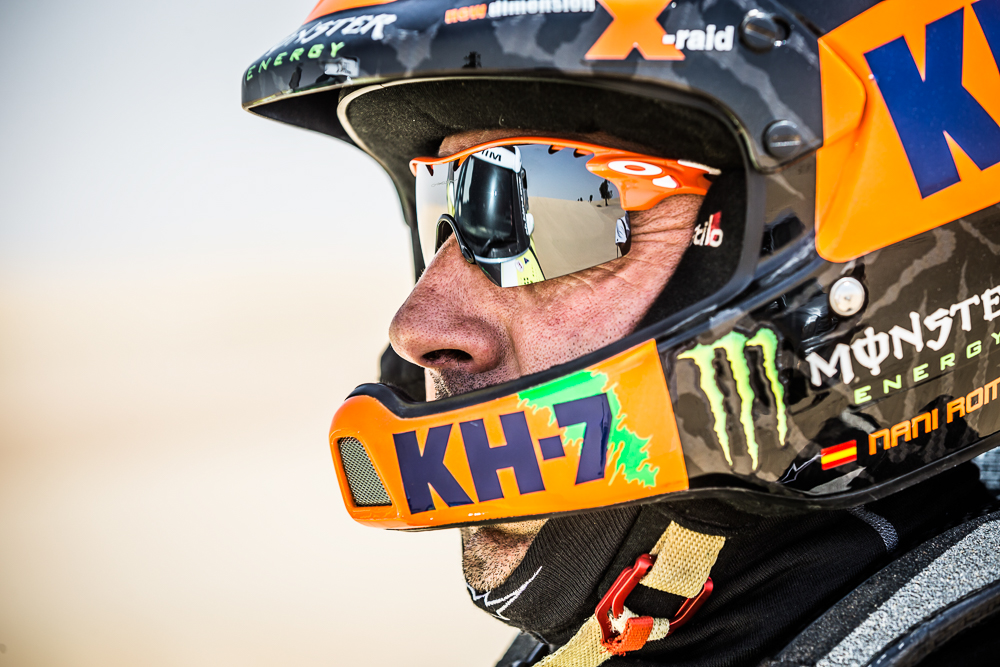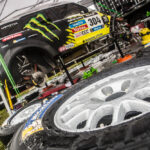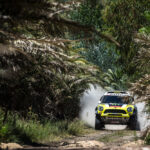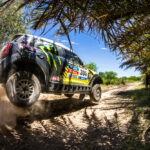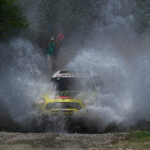INTERVIEW with 2014 Dakar Rally winner Nani Roma
Interviews | crankandpiston | EVO Middle East
After his run in the X-Raid MINI ALL4 Racing Dakar rally car, James sits down with two-time event winner Nani Roma to discuss the special feeling that only Dakar can produce, THAT team orders controversy, why Peugeot’s return to the sport is a good thing, and why riding with broken fingers is not that big a deal.
Originally posted – 23 April, 2014 | crankandpiston.com
Try to imagine braving thousands of kilometres across rugged terrain, temperatures exceeding 60 degrees at their height, dunes taller than most double decker buses, and rocky enclaves and valleys that prove a haven for punctures, suspension failure and rattled spleens.
The 42-year old Spaniard sitting in front of me has been putting his body through such punishment on the infamous Dakar Rally since 1996. And that’s not even including the pummelling received during 10-round, FIA World Cup for Cross Country Rallies campaigns. Consequently, my opening question to reigning Dakar Rally winner Joan ‘Nani’ Roma, is an easy one: why on earth does he do it?
“It’s a challenge,” he smiles. “Sure, it’s my job, but it’s also my passion. You need that to fight everyday, especially on the Dakar. It’s difficult to explain really, but driving across a completely empty desert, going flat out…it’s just an amazing feeling.”
It’s a feeling he’s experienced many times before, though arguably none were greater than the Dakar in 2014. Across 13 days and more than 8,000km, Nani fended off X-Raid teammates (and former winners) Stephane Peterhansel and Qatar’s Nasser Al-Attiyah, as well as rivals from Toyota and Hummer, to secure his second victory on the event. In doing so, Nani became only the third man in history – after that man Peterhansel and trendsetter Hubert Auriol – to win the Dakar on both four wheels and two. He even managed to do so 10 years to the day as his first victory with KTM in 2004.
“When it’s the same day – January 18, 2004 on the bike and January 18, 2014 in the car – that does make it more special,” Nani continues. “It really was one of the best moments of my professional life.
“You dream that one day you will get the chance to compete in the Dakar, but you never dare dream that you might win. When you race for the first time, you think ‘maybe it is possible to win’. And when you win on a bike, it’s another crazy dream achieved! I never expected to win with cars too. Clearly anything is possible.”
The victory bubbly however was tainted in 2014 by the much-publicised team orders row that rocked X-Raid.
With barely two minutes separating leader Nani from 2nd-placed Peterhansel, and with 3rd-placed Al-Attiyah snapping at their heels, the call came from X-Raid team boss Sven Quandt to maintain position and preserve a MINI podium lockout rather than risk a potentially embarrassing eleventh hour retirement. For Nani, having led throughout and taken two stage victories, the call was ideal. For his French teammate, having battled back from 40 minutes in arrears after problems early on, it was a bitter blow.
“Y’know, this is motorsport, and as such team orders do exist,” a contemplative Nani begins. “They can decide the result of the rally and sometimes this can happen three or four days before the finish. Take Mitsubishi in 2007, when [Luc] Alphand and Stephane [Peterhansel] were fighting for the win” – during which team orders issued with several stages still to go went in Peterhansel’s favour. – “And at the time, nobody said anything. This year, I think the team were very fair. On the last day, overall I was 20 seconds ahead of Stephane and Nasser, and the call came, ‘no more risks guys, stop.’
“It’s at that moment you realise the cost of fighting, and how important a full podium is to MINI. If you lose two cars on the final day – and you can – you would look stupid.
“The reaction of the press was unbelievable. I was a little pissed off with that. I’d made a really good race, I’d won two stages, Michel [Perrin, co-driver] had done an amazing job, and we’d stayed at the front for eight days. We’d worked hard for that win.”
Another key term: ‘hard work’. Last season – his third driving the X-Raid MINI ALL4 Racing – proved incredibly successful, for although victory on the Dakar eluded him (Nani eventually finished 4th after problems early on dropped him out of the top 10), victories came on the Hungarian Baja, Baja Aragon in Spain, Desafio Ruta 40 in Argentina and the Abu Dhabi Desert Challenge. It was a hard-fought win in the UAE, one which Nani was looking good to repeat earlier this year until illness took hold and ground proceedings to a halt.
“It’s always during endurance rallies that I have problems like this. On the bikes it wasn’t an issue, but it is in the car especially in the UAE, and I’m not sure why. This year in Abu Dhabi, I won the first stage, and on the second I stopped maybe seven times. My stomach was completely destroyed and the world was turning in my head.
“It’s always difficult to decide whether you should stop. A little pain is no problem: I’ve driven with broken fingers in the past. But when you are sick, you lose all your energy and you feel sleepy in the car. This is dangerous. And in Abu Dhabi, I couldn’t focus my eyes properly, so Michel and I decided to stop. I’m only human!”
It seems remarkable, given his years on the dunes on a bike, that motion sickness is Nani’s Achilles heel. It’s rarely the only one though. One particularly frustrating year on the Dakar came in 2000, his third from an eventual eight seasons with KTM. Having led the event from the off aboard his LC4 660 R, an engine issue struck with just two days left to run, relegating the Spaniard to 17th at the flag after a prolonged engine change.
“That was horrible. That year was my year, believe me. With KTM, our bike was not in condition to fight Yamaha and BMW for the wins. There were too many mechanical mistakes and I stopped too many times from engine problems.
“But I learnt a lot from that, and I still do. When you drive, or ride, and stay in the top five, that’s one thing. When you’re leading the race for days and days, it’s a whole new pressure. So I’ve learnt to manage this position, being fast but consistent.
“And because of that, I think Dakar is a really interesting rally. Not just the victory – that’s already in the past – but for me, it’s nice to feel these different things. Sometimes it’s hard. Sometimes everything goes your way, but you’re always learning.”
Bizarrely, 17th in 2000 and his victory in 2004 stand as the only classified finishes for Nani on two wheels on the Dakar. As such, in 2005, the Spaniard made the jump to Mitsubishi for his four-wheel initiation: “I was 32 years old, and it was time to try something different.”
A solid run netted him 6th straight out the bag in the Pajero, as well as a home win on the Baja-Spain. A podium came calling on the Dakar the following year, though the results wouldn’t start to roll in until 2012 (following two fruitless seasons with BMW). In 2012, the new X-Raid MINI ALL4 Racing was the car to beat, securing Nani, alongside three-time Dakar winner Michel Perrin as co-driver, 2nd behind Peterhansel. It’s a relationship that’s produced 23 stage victories, tying Nani with five-time winner Marc Coma for 13th on the Dakar’s all-time list.
“When Mitsubishi stopped, I moved to BMW, but the company wasn’t really involved with rallying. MINI though is an amazing brand, and it has competition in its blood from the Monte Carlo Rally and Mr Cooper. Also, the MINI guys have an open mind, and to show to the world that they can win one of the toughest motorsport races in the world with a Countryman, this is something amazing. I enjoy working with MINI. I enjoy working with X-Raid. And for me, it’s a nice new challenge.”
In 2015, Nani and Michel will have their work cut out when Peugeot makes its much-publicised return to the Dakar for the first time in 25 years. With former winners Carlos Sainz and Cyril Despres on-board (the former a two-time World Rally Champion, the latter making his first Dakar start on four wheels), the competition will be tough. For Nani though, it’s just another exciting challenge.
“This is important for us, that a new factory team is coming. It’s a big motivation for us for a big team to come in with a good car, good drivers and a good budget. The value of your victory is measured against the cars and drivers you are fighting. And that’s what’s important for me. My life has to involve passion, and this is the reason I love this job. The day when my passion is gone or has slowed down, this is the day I stop. But at the moment, the desire to continue and try to win again is still there. It will be for a long time.”
Images | X-Raid and MCH Photo
Interviews | crankandpiston | EVO Middle East | James Gent

